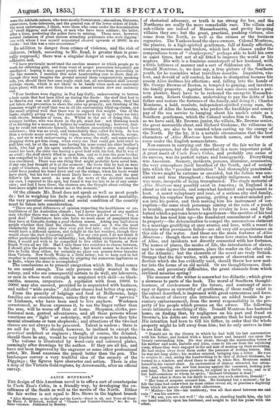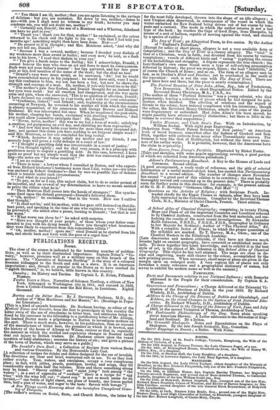ALICE MONTROSE. * TEE design of this American novel is to
offer a sort of counterpoise to Uncle Tom's Cabin in a friendly way, by developing the ex- cellences of the South as well as the merits of the North. Either the fair writer is not equal to Mrs. Stowe in the highest branch '0 Alice Montrose ; or the Lofty and the Lowly—Good in all, and None all Good' By Maria J. M'Intosh, Author of •• Charms and Counter-Charms," &c. ite. In three volumes. Published by Bentley.
of rhetorical advocacy, or truth is too strong for her, and the Northerns are really the more remarkable race. The villain and sub-villain are indeed of Massachusetts, and pretty far-going villains they are ; but the great, practical, pushing virtues, also come from the North, as well as the crimes or the business rogueries. The Yankees head the slave-owners. Colonel Montrose, the planter, is a high-spirited gentleman full of family affection, scorning meannesses and traders, which last he classes under the compendious term of "shopkeepers," perhaps able to hold his own in qoiet times, but not at all fitted to improve the world or his negroes. His wife is a feminine counterpart of her husband, with a iittle loftiness of manner and a sort of Siddonian air. His son, Donald Montrose, is, we dare say, a true picture of the Southern youth, for he resembles what travellers describe. Impulsive, vio- lent, and devoid of self-control, he takes to dissipation because his cousin Alice declines his affection; and, falling into the hands of Mr. George Browne of Boston, is tempted to gaming, and involves the family property. Against these and some slaves under a pat- tern planter, there have to be reckoned the energetic Massachu-
setts man, Robert Grahame, undertaking to pay the debts of his father and restore the fortunes of the family, and doing it ; Charles Montrose, a bold, resolute, independent-spirited young man, the brother of Alice the heroine who prefers the hardships and scanty pay of the sea service to hanging about his uncle's estate as a Southern gentleman, which the Colonel wishes him to do. Then, as we have said, Mr. Browne junior, the villain, Mr. Browne senior, the great mercantile cheat, and Richard Grahame, the villanous in- strument, are also to be counted when casting up the energy of the North. By the by, it is a notable circumstance that the best characters of Alice Montrose have Scotch names, and the worst come under the English nomenclature. Non-success in carrying out the theory of the fair writer is Of no consequence, but she fails somewhat in a more important point. A great merit of Uncle Torn's Cabin, and probably one cause of its success, was its perfect nature and homogeneity. Everything was American. Scenery, incidents, persons' disirourse, accessories, the very atmosphere itself breathed of the South, and of society into which the "peculiar institution" had thoroughly penetrated. The views might be extreme or onesided, but the fiction was con- sistent and true throughout ; thoroughly indigenous, and what was more, incapable of being transplanted. The staple material of Alice Montrose may possibly exist in America ; in England it is about as old as novels, and somewhat hacknied and unpleasant to boot. A secret voluptuary and roué, of a serious city and family,. drawing his supplies from gaming, getting a weaker-minded per- son into his power, and then making him his instrument of cor- ruption—the same stock personage aiming at the ruin of a youth in trouble, prompted thereto both by rivalry in love and by the hatred which a parvenu bears to agentleman—the sacrifice of his tool when he has used him up—the fraudulent concealment of a right to property—the determination to compel the unconscious claimant to a marriage gratifying at once avarice and lore, with a resort to violence when persuasion failed—are all very old acquaintances on this side of the water. And these are the main features of Alice Montrose ; though there are two or three love stories besides that of Alice, and incidents not directly connected with her fortunes. The names of places, the modes of life, the introduction of slaves, and to some degree the manners, place the reader on the other side of the Atlantic ; but the elements of the novel are truly British. Strange that the fair writer, with powers of observation and re- flection which she has evidently used, should throw her new mat- ter into the forms of an old mould. Or are thoughtlessness, dissi- pation, and pecuniary difficulties, the great channels from which
civilized miseries spring ? The manner of the writer is somewhat too didactic ; which gives
a slowness to parts of the book. The moral of Southern thought- lessness, of carelessness for the future, and contempt of accu- racy or figures as unworthy of gentlemen, if these really exist to the extent described, is impressed with great earnestness and force. The element of slavery also introduces an added trouble to pe- cuniary embarrassment, from the moral responsibility in the pro- perty of his people which presses on the owner. The following scene intimates something of this. Donald Montrose has hastened home, on finding that, by negligence on his part and fraud on Browne's his debts are very much greater than he had supposed. His intention had been to tell his father, in order that the whole property might be left away from him; but he only arrives in time to see him die.
"Donald sat in the library in which he had held his last conversation with his father, and looked with a heavy heart and languid eye upon the beauty surrounding him. He was alone, though the murmuring voices of his mother and aunt, Isabelle and Alice, came to his ear from the adjoining room, where they were engaged in the sad task of making up their mourning. He had stolen away from them under the pretence of writing letters. But he was not long alone; his mother entered, bringing him a letter. He rose to receive it ; and, seeing the handwriting to be that of Robert Grahame, he turned to a window' and stood there to read it, while Mrs. Montrose seated herself in his vacant chair. An exclamation of dismay attracted her atten- tion; and, turning, she saw him leaning against the casement, looking pale and faint. To her anxious question, he replied in a feeble voice, and as if but half-conscious to whom he spoke, 'Richard Grahame is dead
"'And what is there in his death to cause you such emotion, Donald?'
"Her tone of surprise aroused him. He hesitated but a moment; for he felt the time had coma when he must either reveal all, or practise a duplicity from which his nature shrank with abhorrence. "Mother—his life—his testimony, was all that stood between me and ruin !' was his answer. " ' My son, you are nat well !' she said, as, standing beside him, she laid one hand tenderly upon his forehead, and sought to feel his pulse with the other.
"You think I am ill, mother ; that you are again listening to the ravings of delirium : but you are mistaken. Sit down by me, mother,—listen to me—with you I shall need no witness to my truth; however you may condemn me, you will not doubt me, mother ? ' "Certainly not, Donald; the son of a Montrose and a Wharton, falsehood can have no part in you.'
"'Thank you! thank you for that, mother !' he exclaimed, as the colour returned to his cheek and the light to his eye. 'Oh that I had told you months ago! something might then have been done. Now—'
"He paused as if in thought ; and Mrs. Montrose asked, 'And why did you not tell me, Donald?' '" Because I was a coward, mother ; because I dreaded your disdain of my weakness more than sword or bullet ; and even now,' he said, as a flash rose to his brow, 'I read that disdain in your eye.' "'You give a harsh name to the feeling; but I acknowledge, Donald, I cannot honour the man who does an act and fears to meet its consequences. Such were not your father's lessons ' : her lips quivered, and her face grew pale at this first mention of the name of the dead ; but she shed no tear. "Donald's eyes were more moist, as he answered, ',eh! but he would have remembered mercy in his judgment : he would have said, were I snak- ing this confession to lann, my son has been a boy, but now he shows the strength and courage of a man. Ah, mother, if you only loved me as he did.' "The mother's sale face flushed, and Donald thought for an instant that her eyes were moist : but all emotion had disappeared, and she was again calm and pale, when she answered, 'This is no question of affection, Donald; I have declared my confidence in your truth, and I wait for your confession.' "Confession, indeed!' said Donald ; and, beginning at the circumstances occurring at Newport, he revealed to his mother all with which the reader is already acquainted, of his connexion with George Browne and Richard Grahame. lie was interrupted but once. When he mentioned the post-obits, his mother, clasping her bands, exclaimed with startling vehemence, 'And you could allow yourself to anticipate that ! Oh, Donald!' "'Never, never, mother! this was to me but a form of words; satisfying a creditor, yet postponing an evil day, and shielding me from reproaches.' "'And now this man holds your notes for more than sixty thousand dol- lars; and against this claim you have nothing to set butyour simple word ? ' said Mrs. Montrose, as her son concluded his long recital. " 'Which, however it may satisfy my mother and my friends, I can scarcely hope will prove a valid defence in a court of law.' " ' I thought a gambling debt was irrecoverable in a court of justice.' "'You thought rightly ; and for that very reason, it is a principle with gentlemen never to dispute a gambling debt. In this case, however, I have again no proof but my simple word that the debt was contracted in gamb- ling—the notes are "for value received."' 'I see no redress.'
"'There is none : a lawyer whom I consulted in Boston, and who expect- ed from Richard Grahame's testimony more than I did, writes me—hie letter was enclosed in Robert Grahame's—that he sees no possible line of defence which is tenable under such circumstances.'
" ' And what do you intend ? ' "'To pay, as far as I ean, this unjust claim, but to do so under protest of its injustice, and an avowal of my determination to leave no means untried to prove the villain what he is.' " 'Then Montrcse Hall passes into the hands of strangers!' Her eyes be- came fixed upon the distant graveyard—Donald's followed them. " 'Oh, mother !' he exclaimed, that is the worst. How can I outlive that thought.'
"'It shall not be,' said his mother, with her gaze still fastened on that dis- tant point, and speaking in the tone of one who registers a vow. 'That shall be prevented,' she added after a pause, turning to Donald ; but that is not the worst.'
"'What worse can there be ? ' he asked with surprise. Have you thought of your people; of those whom your father com- mended to you with his dying breath ? Have you thought what treatment they were likely to experience from this remorseless villain ? ' "'Oh, mother, mother ! spare me!' cried Donald as he started from his seat, and strode back and forth with the pace of a caged lion."



























 Previous page
Previous page